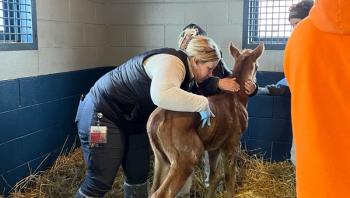
AVMA delegates assert power, buck leadership trends
Minneapolis — American Veterinary Medical Association (AVMA) delegates challenged two Executive Board decisions on resolutions by voting to defeat a foie gras ban and advance a U.S. microchip standard.
MINNEAPOLIS — American Veterinary Medical Association (AVMA) delegates challenged two Executive Board decisions on resolutions by voting to defeat a foie gras ban and advance a U.S. microchip standard.
The moves proved unusual because they reversed initiatives that carried executive leadership counsel and seemingly inevitable fates. During July's AVMA's annual convention in Minneapolis, the House of Delegates (HOD) unanimously decided not to vilify foie gras production practices and charged the association with using "political, legal and media campaigns" to support what Europe has backed for years — the International Organization For Standardization (ISO) microchip. "We have allowed market forces to dictate the standard," the resolution states.
Brought by nine state veterinary medical associations, the resolution's passage charges AVMA with working to lobby for a permanent consensus to resolve the issue. Confusion exists because companies vie for business using competing chip frequencies, scanners and identification databases, the resolution says.
AVMA delegates call for microchip standardization, foie gras support
"We have watched these groups persist in legal activities involving patents and ownership rights that have delayed any national consensus to the detriment of companion animals and to the detriment of our members," the resolution says.
AVMF support continues
While less ardent on the microchip debate, the California Veterinary Medical Association (CVMA) avidly defended its own resolution, which failed to pass the House. CVMA highlighted financial woes within the American Veterinary Medical Foundation (AVMF) by asking the AVMA Executive Board to "suspend" its promotion of the non-profit entity. While AVMA leaders struggle to revamp the foundation and reduce its expense-to-income ratio, AVMF supporters predicted losing the association's promotional support would permanently damage the charity.
Resolutions at a glance
On the block
Like the Executive Board's foie gras resolution, an activist-backed measure also pushing to gain opposition for the forced feeding of ducks and geese failed. Delegates disregarded the resolution, first submitted during the 2004 House meeting in Philadelphia, in favor of the Executive Board's version. Shadowed by its virtual twin, the older resolution received little discussion or attention.
A resolution to move the AVMA's annual leadership conference, however, received plenty of talk during the House's reference committee hearings. Submitted by Nebraska and North Dakota veterinary medical associations, the initiative requested the January meeting be moved from downtown Chicago to a site close to AVMA headquarters in nearby Schaumburg, Ill. Moving the meeting "would allow participants to tour the AVMA headquarters building," the resolution says.
While the cost savings for AVMA staff travel and lodging was estimated at $10,500, the discount did little to drum up support. Participants outside of Nebraska and North Dakota cited Schaumburg as less of a draw in January, and the resolution subsequently failed.
Current leaders
Apart from the resolutions, AVMA successes included designation of Dr. Henry Childers as president, taking the reins from Dr. Bonnie Beaver whose legacy includes raising animal welfare aims.
Childers, of Rhode Island, ran uncontested for the seat, which acts as the figurehead representing the profession for a one-year term. The small animal practitioner also has led the American Animal Hospital Association and Rhode Island Veterinary Medical Association. In a speech before his delegate colleagues, he pledged "unity".
"Today our profession is facing challenges, the likes of which we've never seen before," he says. "While we may practice in different disciplines ... we must be of one vision, one voice. We must cooperate and collaborate with our fellow veterinarians worldwide to make this world a better place for animals and humans alike."
Dr. René Carlson will serve alongside Childers for a second consecutive term as AVMA vice president. Uncontested for the seat, the Wisconsin small animal practitioner takes on a leadership role as official liaison to the Student AVMA and student chapters of the AVMA.
Carlson ranks as one of a few AVMA officials to serve two vice presidential terms.
The 2006-2007 presidency goes to Dr. Roger Mahr, former Executive Board chair. Now president-elect, the small animal practitioner from Geneva, Ill., ends a six-year term as board representative for District VI. The office's sole candidate was elected by HOD unanimous consent.
Mahr pledges to focus on improving animal and human health.
Presidential race
Next year's Honolulu convention is set to host AVMA's first contested presidential race since Dr. Jan Bartels lost to Dr. Jack Walther in 2002.
Drs. Charles Stol-tenow, of North Dakota, and Greg Hammer, of Delaware, announced their candidacies during the Minneapolis convention.
While Hammer, a small animal practitioner, runs on his record as a former delegate and Legislative Advisory Committee chair, he's left his seat on the Executive Board to campaign for the year.
At the same time, Stoltenow lost his bid for a second term chairing the House Advisory Committee to Massachusetts delegate Dr. John de Jong.
The North Dakota extension veterinarian and chairman of the Constitution and Bylaws Task Force is an epidemiologist by training, known to consult with U.S. and oversees governments on bioterrorism agents.
Newsletter
From exam room tips to practice management insights, get trusted veterinary news delivered straight to your inbox—subscribe to dvm360.




